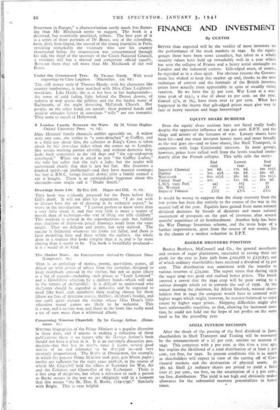FINANCE AND INVESTMENT
By CUSTOS
BErrER than expected will be the verdict of most investors on the performance of the stock markets in 1940. In the equity groups there have been some casualties, but taken as a whole security values have held up remarkably well in a year which has seen the collapse of France and a heavy aerial onslaught on London and the industrial centres. Gilt-edged must, of course, be regarded as in a class apart. For obvious reasons the Govern- ment has wished to keep this market up and, thanks to the new technique of control and the fortitude of the British investor, prices have actually risen appreciably in spite of steadily rising taxation. So we have the 34 per cent. War Loan at a war- time peak of io3A, a rise of about to per cent. on the year. Gonsol 24's, at 76,7,-, have risen over 12 per cent. What has happened to the theory that gilt-edged prices must give way in face of heavy taxation and huge borrowings?
EQUITY SHARE BURDENS
Even the equity share sections have not fared really badly despite the oppressive influence of too per cent. E.P.T. and the slings and arrows of the fortunes of war. Luxury shares have been hit-and one must interpret luxury more and more broadly as the war goes on-and so have shares, like Shell Transport, in companies with large Continental interests. In most groups, however, prices have rallied well from the levels touched imme- diately after the French collapse. This table tells the story:
Imperial Chemical Dunlop ... Woolworth
United Steel L.M.S. 1923 Pref. Gt. Western Imperial Tobacco
• • • •• • •• • •• • •••
• • • • . •
End
1939 3os. 6d. ...
3os. 44d. ... 61s. told.... 21S.
444 ...
37 •••
£51-1 •••
Lowest 1940 17s. 9d.
19s. 9d.
38s. 6d.
Its. 6d.
214 221
£34 End 1940
29S. !Old.
32s. 9d. 53S.
21s. 9d. 37 33 £5114 It would be wrong to suppose that the sharp recovery from the low points has been due entirely to the course of the war in the second half of the year. Equities have gained from more rational dividend decisions by boards of directors and more rational assessment of prospects on the part of investors after several months' experience of air bombardment. Another help has been the War Damage Insurance scheme, and the main hope of a further improvement, apart from the course of war events, lies in the chance of a modest reduction in E.P.T.
BOOKER BROTHERS POSITION
Booker Brothers, McConnell and Co., the general merchants and owners of sugar plantations, succeeded in raising their net profit for the year to June 30th from £102,688 to £137,837, out of which ordinary shareholders have received a dividend of 15 per cent. This distribution was consistent with the transfer to various reserves of £25,000. The report states that during 1939 the sugar crop was good and realised better prices. The board entered a caveat that the 1940 crop will be poor owing to a serious drought which set in towards the end of 1939. At the annual meeting the chairman, Sir Alfred Sherlock, warned share- holders that in 1940 the company would have to contend with higher wages which might, however, be counter-balanced to some extent by higher sugar prices. Shipping difficulties might also have unfavourable reactions, so that, allowing for increased taxa- tion, he could not hold out the hope of net profits on the same level as for the preceding year.
SHELL INTERIM DECISION After the shock of the passing of the final dividend in June, shareholders in Shell Transport and Trading will be reassured by the announcement of a 24 per cent. interim on account of 1940. This compares with 5 per cent. at this time a year ago, but implies the likelihood of a total distribution of at least 5 per cent., tax free, for 1940. In present conditions this is as much as shareholders will expect in view of the cutting off of Con- tinental markets and the destruction of physical assets. At 38s. 9d. Shell Li ordinary shares are priced to yield a little over 24 per cent., tax free, on the assumption of a 5 per cent., tax free, distribution. The yield is not high and obviously makes allowance for the substantial recovery potentialities in better
times. •






























 Previous page
Previous page